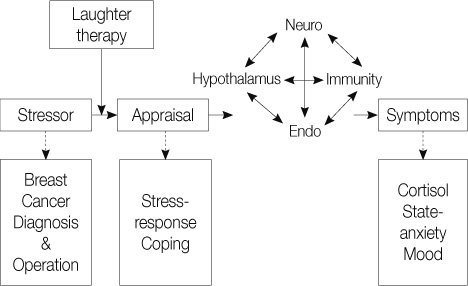J Korean Oncol Nurs.
2011 Aug;11(2):93-100.
The Effects of Laughter Therapy on Stress Responses in Patients with Preoperative Breast Cancer
- Affiliations
-
- 1Seoul National University Hospital, Seoul, Korea.
- 2College of Nursing, The Research Institute of Nursing Science, Seoul National University, Seoul, Korea. hanipyh@snu.ac.kr
Abstract
- PURPOSE
The purpose of this study was to examine the effects of laughter therapy on mood, state anxiety, and serum cortisol based on a Stress-Coping Model for preoperative breast cancer patients.
METHODS
The study used a nonequivalent control group pretest-posttest design. The participants were 40 breast cancer patients who were admitted to one general hospital for surgery in 2009 (experimental group 23, control group 17). The experimental group received one hour laughter therapy consisting of dance, lots of laughter techniques, and meditation.
RESULTS
The mean ages were 47 years (experimental group) and 49 years (control group). There were no significant differences in demographic and disease-related characteristics between the two groups. After the intervention, the scores of mood and state-anxiety of experimental group were significantly improved than those of control group. However, no difference was found in serum cortisol.
CONCLUSION
The laughter therapy was partially effective in improving stress response in patients with breast cancer. Further research is needed to develop and evaluate the longer periods of interventions to testify the effects on serum cortisol, and other biochemical variables.
Keyword
MeSH Terms
Figure
Reference
-
1. Kim SH, Kim YH, Kim HJ, Lee SN, Yu SO. The effects of laughter therapy on depression, anxiety, and stress in patients with breast cancer undergoing radiotherapy. J Korean Oncol Nurs. 2009. 9:155–162.2. Kim KH, Lee MH. Effects of humor intervention program on anxiety, depression, and coping of humor in hemodialysis patients. Korean J Rehabil Nurs. 1999. 2:95–108.3. Burgess C, Cornelius V, Love S, Graham J, Richards M, Ramirez A. Depression and anxiety in women with early breast cancer: five year observational cohort study. BMJ. 2005. 330:702–705.
Article4. Kim HJ, Suh MJ. Effect of humor video tape on an anxiety, depression and coping of the imparied mobility patient. Seoul Journal of Nursing. 1996. 10:203–217.5. Larson MR, Duberstein PR, Talbot NL, Caldwell C, Moynihan JA. A presurgical intervention for breast cancer patients: psychological distress and the immune response. J Psychosom Res. 2000. 48:187–194.6. Kim YS, Jun SS. The influence of one-time laughter therapy on stress response in the elderly. J Korean Acad Psychiatr Ment Health Nurs. 2009. 18:269–277.7. Lebel S, Rosenberger Z, Edgar L, Devins GM. Predicting stress-related problems in long-term breast cancer survivors. J Psychosom Res. 2008. 65:513–523.
Article8. Lazarus RS, Folkman S. Psychological stress and the coping process. 1984. New York: Springer.9. Clark A, Seidler A, Miller M. Inverse association between sense of humor and coronary heart disease. Int J Cardiol. 2001. 80:87–88.
Article10. Fry WF. The biology of humor. HUMOR. 1994. 7:111–126.
Article11. Johnson P. The use of humor and its influences on spirituality and coping in breast cancer survivors. Oncol Nurs Forum. 2002. 29:691–695.
Article12. Lebowiz KR. The effects of humor on cardiopulmonary functioning, psychological well-being and health status among older adults with chronic obstructive pulmonary disease. 2002. Columbus, USA: Ohio University;[Unpublished doctoral disseratation].13. Hajime K. Reduction of plasma levels of neurotrophins by laughter in patient with atopic dermatitis. Pediatr Allergy Immunol. 2004. 17:131–135.14. Bennett MP, Zeller JM, Rosenberg L, McCann J. The effect of mirthful laughter on stress and natural killer cell activity. Altern Ther Health Med. 2003. 9:38–44.15. Marie G, Angela C, Sallie D, Patricia B, Deborah W. Study confirms belief that laughter is the best medicine. AORN J. 2004. 80:241.16. Kim JT, Sin DG. A study based on the standardization of the STAI for Korea. New Med J. 1978. 21:1220–1223.17. Hur EH. Effects of laughter therapy on mood, stress and quality of life in patients with hemodialysis [Unpublished master thesis]. 2007. Kyungi: Cha Medical University.18. Kim KS, Lee SW, Choe MA, Yi MS, Choi S, Kwon SH. Effects of abdominal breathing training using biofeedback on stress, immune response and quality of life in patients with a mastectomy for breast cancer. J Korean Acad Nurs. 2005. 35:1295–1303.
Article19. Berk LS, David L, Felton S, Tan A, Barry B, Bittman JW. Modulation of neuroimmune parameters during the eustress of humor-associated mirthful laughter. Altern Ther Health Med. 2001. 7(2):62–76.20. Balick MJ, Lee R. The role of laughter in traditional medicine and its relevance to the clinical setting: healing with ha! Altern Ther Health Med. 2003. 9(4):88–91.21. Kim YS, Jun SS. The influence of one-time laughter therapy on stress response in the elderly. J Korean Acad Psychiatr Ment Health Nurs. 2009. 18:269–277.22. Cline ME, Herman JA, Shaw ER, Morton RD. Standardization of the visual analogue scale. Nurs Res. 1992. 41:378–379.
Article23. Ganz PA, Schag AC, Lee JJ, Polinsky ML, Tan SJ. Breast conservation versus mastectomy. Is there a difference in psychological adjustment or quality of life in the year after surgery? Cancer. 1992. 69:1729–1738.
Article24. Cohen J. Statistical power analysis for the behavioral sciences. 1988. 2nd ed.Hillsdale NJ: Erlbaum.25. Spielberger CD. Anxiety: state trate process in stress and anxiety. 1975. New-York: John Wiley and Sons;3–26.26. Hassed C. How humor helps keep you well. Aust Fam Physician. 2001. 30:25–28.27. Lengacher CA, Bennett MP, Kip KE, Keller R, La Vance MS, Smith LS, et al. Frequency of use of complementary and alternative medicine in women with breast cancer. Oncol Nurs Forum. 2002. 29:1445–1452.
Article
- Full Text Links
- Actions
-
Cited
- CITED
-
- Close
- Share
- Similar articles
-
- The Effect of Laughter Therapy on Depression, Anxiety, and Stress in Patients with Breast Cancer Undergoing Radiotherapy
- Effects of Laughter Therapy on Depression, Quality of Life, Resilience and Immune Responses in Breast Cancer Survivors
- Effects of Laughter Therapy on Postpartum Fatigue and Stress Responses of Postpartum Women
- The Effects of Laughter Therapy Program on Perceived Stress, and Psycho-Neuro-Endocrino-Immuno Responses in Obese Women
- Effects of Visiting Laughter Therapy on Depression and Insomnia among the Vulnerable Elderly


